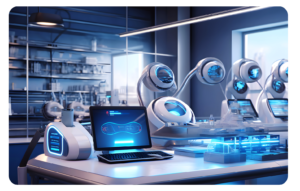- February 15, 2024
- by ConclaveTechnologies
- AI Technology
- 0 Comments
In the digital age, businesses are under constant pressure to streamline operations, reduce costs, and improve efficiency. As a result, Business Process Automation (BPA) has become increasingly critical for organizations seeking to stay competitive in today’s fast-paced business landscape. Over the years, BPA has evolved significantly, with advancements in technology driving innovation and enabling new possibilities. In this blog post, we’ll explore the evolution of BPA, from traditional Robotic Process Automation (RPA) to AI-powered solutions, and discuss the implications for businesses.
The Rise of Robotic Process Automation (RPA)
Robotic Process Automation, or RPA, emerged as a game-changer in the world of BPA, enabling businesses to automate repetitive, rules-based tasks with software robots. RPA tools mimic human actions to interact with digital systems and applications, performing tasks such as data entry, invoice processing, and order fulfillment. By automating these mundane tasks, RPA frees up human resources, reduces errors, and accelerates process execution, leading to significant efficiency gains and cost savings for organizations.


Limitations of Traditional RPA
While RPA has been instrumental in automating routine tasks, its capabilities are limited to rule-based processes and structured data formats. Traditional RPA systems struggle to handle unstructured data, complex decision-making processes, and dynamic environments. As a result, businesses often encounter challenges when trying to automate more complex processes or tasks that require cognitive abilities, such as natural language understanding or pattern recognition.
Enter AI-Powered BPA Solutions
To address the limitations of traditional RPA, a new generation of BPA solutions powered by Artificial Intelligence (AI) has emerged. These AI-powered solutions leverage advanced technologies such as machine learning, natural language processing, and computer vision to automate complex tasks and processes that were previously beyond the scope of RPA. By combining automation with cognitive capabilities, AI-powered BPA solutions enable organizations to achieve new levels of efficiency, flexibility, and innovation.
The Benefits of AI-Powered BPA
AI-powered BPA solutions offer several key benefits over traditional RPA:
- Flexibility and Scalability: AI-powered BPA solutions are more flexible and scalable, capable of adapting to evolving business needs and handling a wider range of processes and data types.
- Cognitive Automation: AI enables cognitive automation, allowing systems to understand, interpret, and act upon unstructured data, such as emails, documents, and images.
- Process Intelligence: AI-powered BPA solutions provide deeper insights into business processes, enabling organizations to identify opportunities for optimization, predict outcomes, and drive continuous improvement.
- Enhanced Customer Experience: By leveraging AI for tasks such as personalized recommendations, natural language understanding, and sentiment analysis, businesses can deliver superior customer experiences and drive customer loyalty.
Conclusion:
Embracing the Future of BPA
In conclusion, the evolution of BPA from traditional RPA to AI-powered solutions represents a significant milestone in the journey towards digital transformation. By harnessing the power of AI, businesses can unlock new possibilities for automation, innovation, and growth. As AI technologies continue to advance, the potential for AI-powered BPA to drive value and competitive advantage will only continue to grow, making it essential for organizations to embrace the future of BPA and stay ahead of the curve in today’s digital economy.
“Stay tuned to our blog for more insights on the latest trends and developments in BPA and AI technology!”


